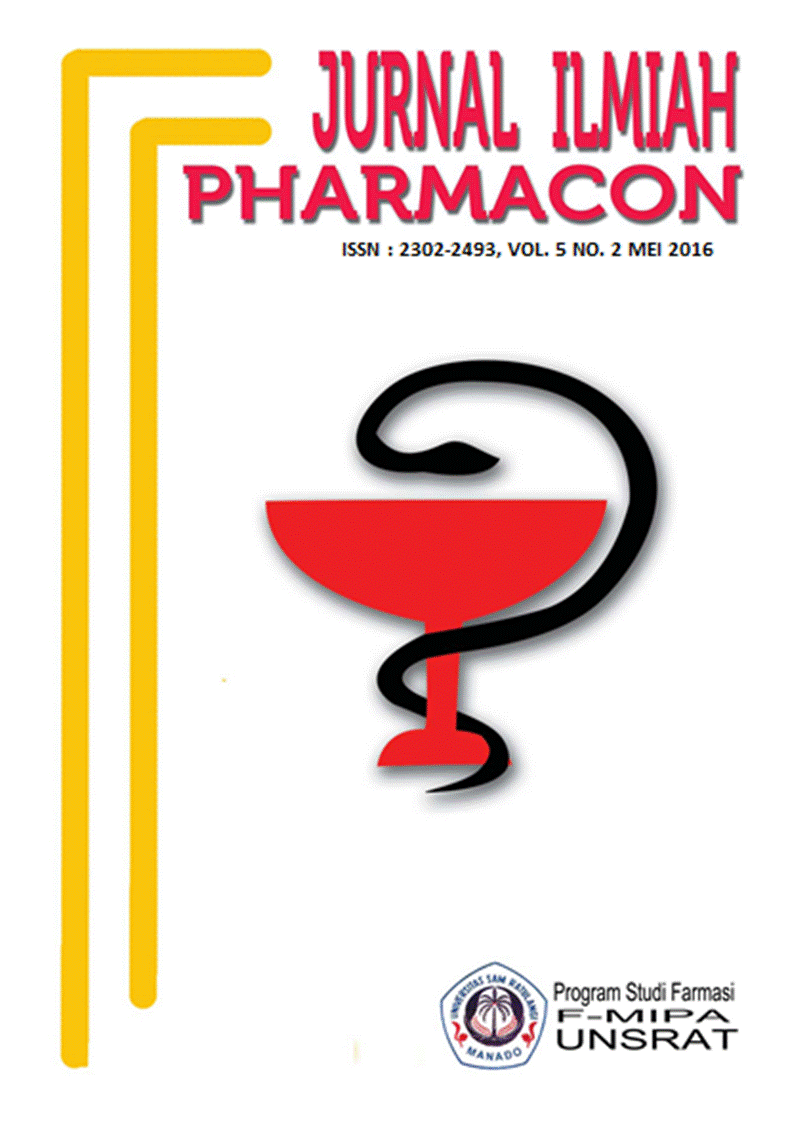HUBUNGAN ANTARA PERILAKU HIDUP BERSIH DAN SEHAT DENGAN KEJADIAN DEMAM TIFOID DI WILAYAH KERJA PUSKESMAS UPAI KOTA KOTAMOBAGU TAHUN 2015
DOI:
https://doi.org/10.35799/pha.5.2016.12215Abstract
HUBUNGAN ANTARA PERILAKU HIDUP BERSIH DAN SEHAT DENGAN KEJADIAN DEMAM TIFOID DI WILAYAH KERJA PUSKESMAS UPAI KOTA KOTAMOBAGU TAHUN 2015
Wulandari Paputungan1), Dina Rombot 1) ,Rahayu H.Akili1)
1)Fakultas Kesehatan Masyarakat, Universitas Sam Ratulangi Manado
ABSTRACT
Typhoid Fever is the a kind of disease that caused by Salmonella typhi bacterial infection. This disease is still be a public health problem especially in development countries. In Indonesia Typhoid Fever is endemic. It is firmly related with health and clean life behavior (PHBS). The occurrence of typhoid fever in the Upai public health center was 302 cases in 2015. The Purposeof this study was to prove the relationship between health and clean life behavior (PHBS) with the incidence of typhoid fever in the working area of Upai public health center of Kotamobagu city in 2015. Methods.This was an analytic-observational study with used cross sectional study design. The population of this study are all of Typhoid Fever patients on January-August 2015, based on medical record of Upai public health center. The sampels of this study are 75 cases. The research instruments are questionnaire and check list sheets. The data were analyzed by using chi-square method. The result.The study result showed that there is relationship between the habits of washing hands after defecation (p=0,041), the habits of washing hand before eating (p=0,047), the habits of eating outside the house (p=0,030), socio economic level (p=0,047), and there is no correlation between the habits of washing raw foods to be eaten immediately (p=0,774) with the occurrence of typhoid fever. The Conclusion ot this Health and clean life behavior (PHBS) can affect the incidence of typhoid fever.
Keywords : Typhoid Fever, Health and Clean Life Behavior (PHBS)
ABSTRAK
Demam tifoid adalah penyakit yang disebabkan oleh infeksi bakteri Salmonella typhi. Penyakit ini masih menjadi masalah kesehatan terutama di negara berkembang. Di Indonesia, demam tifoid bersifat endemis. Penyakit ini berhubungan erat dengan Perilaku Hidup Bersih dan Sehat (PHBS) di masyarakat. Angka kejadian demam tifoid di Puskesmas Upai Kota Kotamobagu adalah sebanyak 302 kasus pada tahun 2015. Penelitian ini mempunyai tujuan untuk membuktikan Hubungan antara Perilaku Hidup Bersih dan Sehat (PHBS) dengan Kejadian Demam Tifoid di Wilayah Kerja Puskesmas Upai Kota Kotamobagu Tahun 2015. Jenis penelitian ini adalah penelitian yang bersifat survei analitis dengan menggunakan metode cross sectional. Sampelditentukan secara random sampling. Populasi dari penelitian ini adalah semua pasien penderita penyakit demam tifoid pada Januari-Agustus tahun 2015, yang diambil berdasarkan data rekam medik Puskesmas Upai Kota Kotamobagu. Sampel dalam penelitian ini adalah sebanyak 75 responden. Instrumen penelitian yang digunakan berupa kuesioner dan lembar ceklis. Data hasil penelitian dianalisis dengan menggunakan  rumus uji Chi Square. Hasil penelitian ini menunjukkan bahwa terdapat hubungan antara kebiasaan mencuci tangan dengan sabun setelah buang air besar (p=0,041), kebiasaan mencuci tangan dengan sabun sebelum makan (p=0,047),kebiasaan makan di luar rumah (p=0,030), dan tidak ada hubungan antara kebiasaan mencuci bahan makanan mentah yang akan dikonsumsi langsung dengan kejadian demam tifoid (p=0,774). Kesimpulan dari penelitian ini adalah bahwa ada Hubungan antara Perilaku Hidup Bersih dan Sehat (PHBS) dengan Kejadian Demam Tifoid di Wilayah Kerja Puskesmas Upai Kota Kotamobagu Tahun 2015.
Kata Kunci : Demam Tifoid, Perilaku Hidup Bersih dan Sehat (PHBS).Salmonella typhi
Downloads
Published
How to Cite
Issue
Section
License
Authors who publish with this journal agree to the following terms:
- Authors retain copyright and grant the journal right of first publication with the work simultaneously licensed under a Creative Commons Attribution-NonCommercial 4.0 International License that allows others to share the work with an acknowledgement of the work's authorship and initial publication in this journal.
- Authors are permitted and encouraged to post their work online (e.g., in institutional repositories or on their website) prior to and during the submission process, as it can lead to productive exchanges, as well as earlier and greater citation of published work (See The Effect of Open Access)










